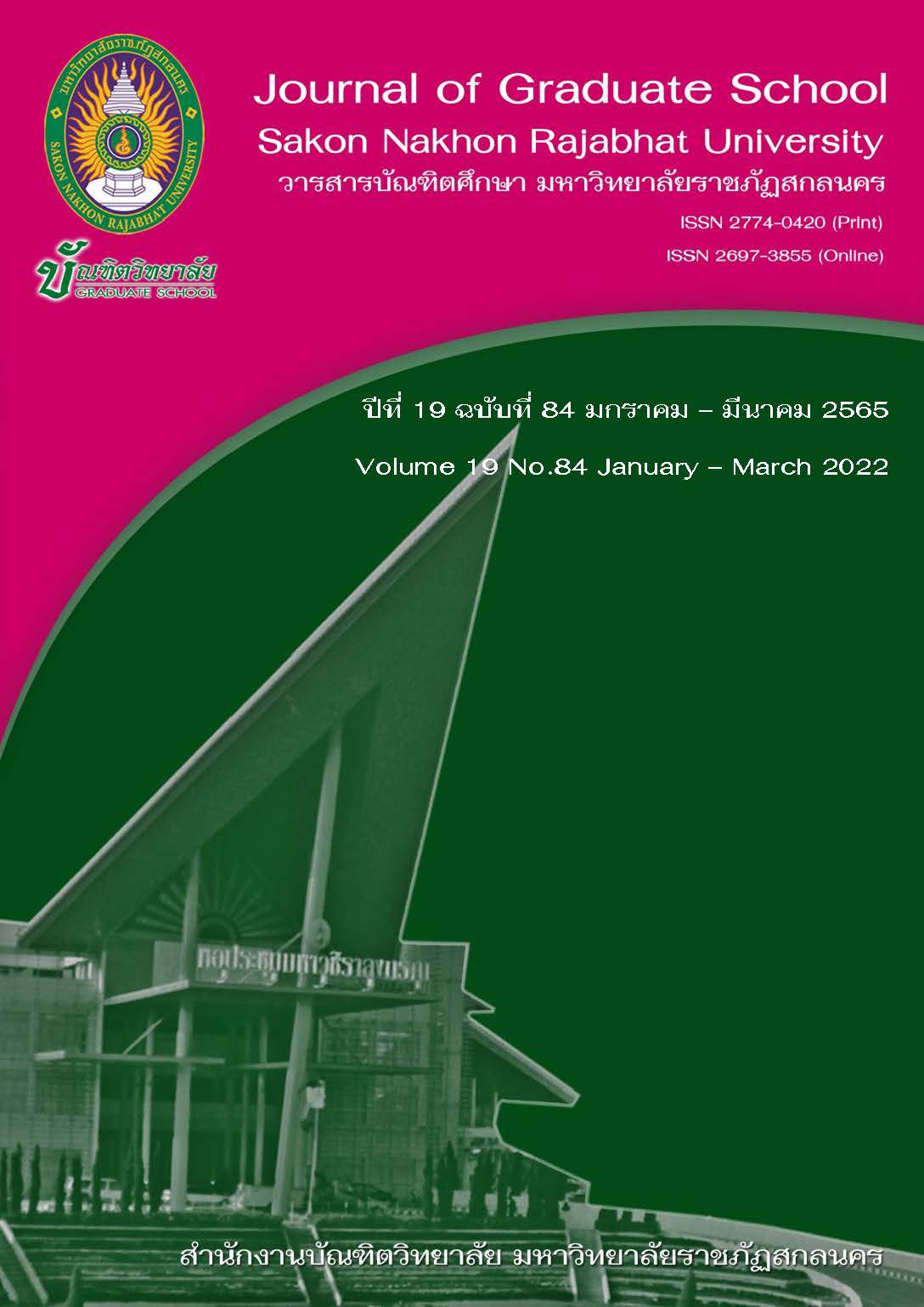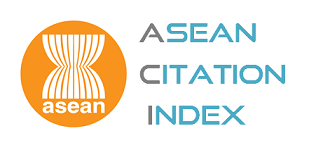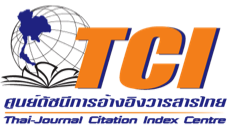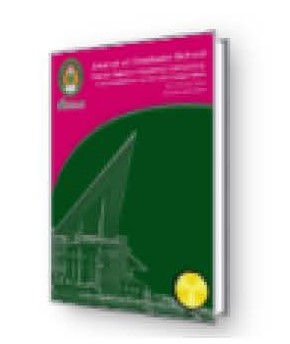การพัฒนาการจัดการเรียนการสอนออนไลน์ เรื่อง ระบบคอมพิวเตอร์ วิชาเทคโนโลยีสารสนเทศและการสื่อสาร สำหรับนักเรียนที่บกพร่องทางร่างกายประเภท 3 สังกัดวิทยาลัยเอกชนภาคตะวันออก
Keywords:
Students with Physical Disabilities, Online Learning, Computer SystemsAbstract
The purposes of this research were: 1) to develop an online instruction on Computer Systems for students with physical disabilities (type 3) under the Private Colleges of the Eastern Region, 2) to investigate the efficiency of the developed online instruction based on the 80/80 criteria, 3) to study the effectiveness index (E.I.) of the developed online instruction, and 4) to examine students' satisfaction toward the use of the developed e-Learning instruction. The sample, obtained through cluster random sampling, consisted of a class of 20 Vocational Certificate II students with physical disabilities (type 3) in the academic year of 2020 at Pattaya Redemptorist College of Technology. The research tools were: 1) Development tools consisted of 1.1) the AppServ Program (version 8.5.0), 1.2) the Visual studio code program, 1.3) the Navicat program; and 2) Assessment Tools consisted of 2.1) An e-Learning instruction on Computer Systems, 2.2) pre-and post-intervention tests, 2.3) a satisfaction assessment form. The statistics for data analysis were mean, percentage, standard deviation (S.D.), the efficiency criterion (E1/ E2), and the effectiveness index (E.I.).
The findings were as follows: 1. The online instruction on Computer Systems consisted of four learning units: 1) computer systems, 2) hardware and software, 3) data input and display devices, and 4) computer assembly and program installation published on the website at https://prtc.ac.th/comsystem. 2. The online instruction achieved the efficiency criteria (E1/ E2) of 81.88/83.17, which was higher than the specified threshold. 3. The online instruction reached the effectiveness index of 0.6456, indicating that the students’ learning mean scores increased by 64.56 percent. 4. The students’ satisfaction toward the developed online instruction was at a high level with a mean score of 4.04.
References
กระทรวงศึกษาธิการ. (2551). พระราชบัญญัติการจัดการศึกษาสำหรับคนพิการ พุทธศักราช 2551. กรุงเทพฯ: สำนักงานปลัดกระทรวงศึกษาธิการ.
ชัยยงค์ พรหมวงศ์. (2556). การทดสอบประสิทธิภาพสื่อหรือชุดการสอน. วารสารศิลปากรศึกษาศาสตร์, 5(3), 7-20.
ฐาปนีย์ ธรรมเมธา. (2557). อีเลิร์นนิง : จากทฤษฎีสู่การปฏิบัติ. กรุงเทพฯ: โครงการมหาวิทยาลัยไซเบอร์ไทย สำนักงานคณะกรรมการการอุดมศึกษา.
ตติยา องค์ศิริพร. (2558). การพัฒนาบทเรียนอีเลิร์นนิง วิชาการวิเคราะห์และออกแบบระบบ : รายงานการวิจัย. กรุงเทพฯ: มหาวิทยาลัยเทคโนโลยีราชมงคลกรุงเทพ.
ทิศนา แขมมณี. (2555). ศาสตร์การสอน : องค์ความรู้เพื่อการจัดการกระบวนการเรียนรู้ที่มีประสิทธิภาพ. (พิมพ์ครั้งที่ 6). กรุงเทพฯ: สำนักพิมพ์แห่งจุฬาลงกรณ์มหาวิทยาลัย.
พทุธมนต์ อัจฉริยนนท์. (2560). การพัฒนาบทเรียนอีเลิร์นนิงตามสภาพแวดล้อมทางการเรียนส่วนบุคคลบนเครือข่ายสังคมออนไลน์ เรื่อง ระบบเครือข่ายคอมพิวเตอร์และการสื่อสารข้อมูลพื้นฐาน. กรุงเทพฯ: มหาวิทยาลัยราชภัฏจันทรเกษม.
พีระพันธ์ เสริมศิริ. (2555). การพัฒนาบทเรียนออนไลน์ผ่านระบบเครือข่าย (e-Learning) วิชาคอมพิวเตอร์พื้นฐาน ง21101 ชื่อหน่วยเรามาร่วมกันเรียนรู้คอมพิวเตอร์กันดีกว่าชั้นมัธยมศึกษาปีที่ 1. สุรินทร์: โรงเรียนจอมพระประชาสรรค์.
รินสุข อุ่นพิกุล. (2559). การพัฒนาระบบอีเลิร์นนิงของนักศึกษาอาชีวศึกษา ประเภทวิชาบริหารธุรกิจ สาขางานคอมพิวเตอร์ธุรกิจ. กรุงเทพฯ: มหาวิทยาลัยเกษตรศาสตร์.
วิจารณ์ พานิช. (2558). วิถีสร้างการเรียนรู้เพื่อศิษย์ ในศตวรรษที่ 21. วารสารนวัตกรรมการเรียนรู้, 1(2), 3-14.
วิสุทธิพงษ์ ยอดเสาดี. (2559). การพัฒนาบทเรียนออนไลน์ กลุ่มสาระการเรียนรู้การงานอาชีพและเทคโนโลยีเรื่องเทคโนโลยีสารสนเทศและคอมพิวเตอร์ สำหรับนักเรียนชั้นมัธยมศึกษาปีที่ 1. กำแพงเพชร: มหาวิทยาลัยราชภัฎกำแพงเพชร.
วัลลภ สุราวุธ. (2561). การพัฒนาบทเรียนออนไลน์ในรายวิชา เทคโนโลยีสารสนเทศและการสื่อสาร โรงเรียนลิ้นฟ้าพิทยาคม.อุบลราชธานี: มหาวิทยาลัยราชภัฏอุบลราชธานี.
Downloads
Published
How to Cite
Issue
Section
License
Copyright (c) 2022 Journal of Graduate School Sakon Nakhon Rajabhat University

This work is licensed under a Creative Commons Attribution-NonCommercial-NoDerivatives 4.0 International License.
บทความทุกบทความที่ตีพิมพ์ในวารสารบัณฑิตศึกษา มหาวิทยาลัยราชภัฏสกลนคร ถือว่าเป็นลิขสิทธิ์ของบัณฑิตวิทยาลัย มหาวิทยาลัยราชภัฏสกลนคร










